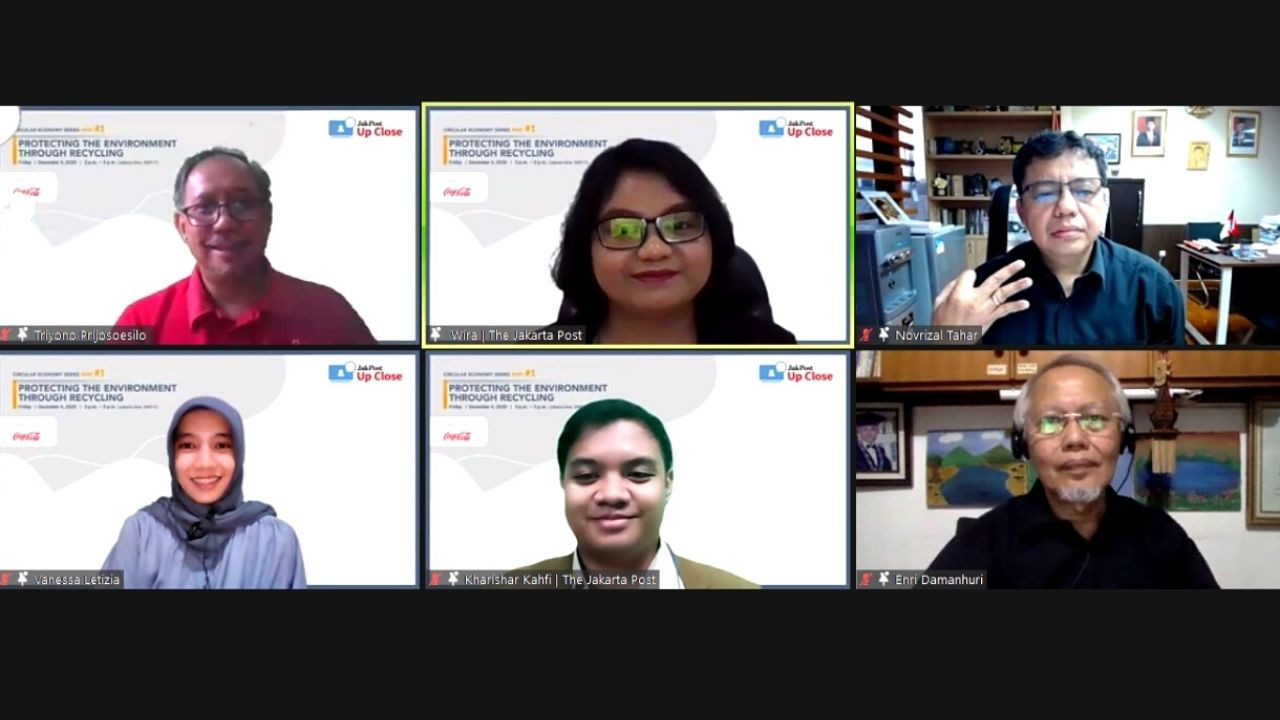Popular Reads
Top Results
Can't find what you're looking for?
View all search resultsPopular Reads
Top Results
Can't find what you're looking for?
View all search resultsStronger collaborations key to improving RI’s lofty waste reduction goals
Last year, less than 50 percent of waste in Indonesia was handled properly despite improvements to the national waste collecting system.
Change text size
Gift Premium Articles
to Anyone
 PT Coca-Cola Indonesia public affairs, communications and sustainability director Triyono Prijosoesilo (top left), Environment and Forestry Ministry waste management director Novrizal Tahar (top right), Greeneration Foundation executive director Vanessa Letizia (bottom left) and waste management professor Enri Damanhuri (bottom right) attend a Jakpost Up Close webinar titled “Protecting the environment through recycling” on Dec. 4, 2020. (JP/Vela Andapita).
Usage: 0 (JP/Vela Andapita)
PT Coca-Cola Indonesia public affairs, communications and sustainability director Triyono Prijosoesilo (top left), Environment and Forestry Ministry waste management director Novrizal Tahar (top right), Greeneration Foundation executive director Vanessa Letizia (bottom left) and waste management professor Enri Damanhuri (bottom right) attend a Jakpost Up Close webinar titled “Protecting the environment through recycling” on Dec. 4, 2020. (JP/Vela Andapita).
Usage: 0 (JP/Vela Andapita)
W
ith waste management problems continuing to mount globally, Indonesia, as one of the world’s largest waste producers, has a key role to play in developing comprehensive waste treatment solutions that involve all stakeholders nationwide.
Indonesia has set a bold vision to reduce waste through Presidential Regulation No. 97/2017. The country aims to cut at least 30 percent of total waste and 70 percent of marine plastic debris.
Under the current pace, Indonesia will produce 70.8 million tons of annual waste in 2025. With the regulation, the government wants to reduce 30 percent of waste (20.9 million tons), which would leave 70 percent (49.9 million tons) to be processed through recycling and other waste treatment methods. However, the question remains: How will Indonesia achieve this ambitious target?
Last year, less than 50 percent of waste in Indonesia was handled properly despite improvements to the national waste collecting system, the Environment and Forestry Ministry’s waste management director, Novrizal Tahar, said during a Jakpost Up Close webinar on Friday.
The webinar, titled “Protecting the environment through recycling” is the first part of Jakpost Up Close’s Circular Economy webinar series held in collaboration with Coca-Cola Indonesia.
Novrizal said the government was eager about bolstering its national strategies and strengthening regulations and international cooperation to improve recycling efforts.
“Simultaneously, we have to elicit change through public awareness. We see now lots of communities appearing before the public [and] a lot of entrepreneurial social movements are also driven by public figures,” he said.
He said the government’s two major undertakings were expanding the circular economy ecosystem by involving all stakeholders, ranging from households to industrial recycling, and improving the environmentally sound aspects of the circular economy.
“The President has ordered that we must supply our own raw materials for the recycling industry domestically, especially the plastic and paper recycling industry. The Environment and Forestry Ministry, the Industry Ministry and the Trade Ministry have created road maps to support the vision.”
Indonesia’s waste collection was dominated by actors in the informal sector, with scavengers collecting 354,900 tons of plastic waste per year, while waste banks and government-owned facilities collected only 69,900 tons per year, Novrizal said.
“This is important because it shows the supply chain of raw materials for waste recycling has not been optimal. At the same time, we need to pay more attention to the informal sector, which has been the backbone of the supply chain,” he added.
A professor of waste management at the Bandung Institute of Technology (ITB), Enri Damanhuri, however, pointed out that strong waste collection networks only existed in Java and Bali.
“What happens is that the plastic collected outside of Java and Bali has to be transferred to the two regions for processing, which means it is no longer economical. The concept of the circular economy is to shorten the logistics flow across the chain,” Enri said.
Greeneration Foundation executive director Vanessa Letizia highlighted the need for improved policy instruments to bring sustainable waste and resource management forward.
In collaboration with the government, companies and environmentalists, Greeneration Foundation has launched various programs to drive waste management advocacy and education, creative media campaigns, waste management information systems and research and community empowerment.
Coca-Cola Indonesia public affairs, communications and sustainability director Triyono Prijosoesilo said the company had taken steps to improve waste management in the country. The measures include redesigning product packaging, building a robust and accessible collection system and forming creative partnerships.
“Waste collection is a big part of the issue in waste management, but there is always an opportunity to tackle it better,” said Triyono, who also serves as the secretary-general of the Packaging and Recycling Association for Indonesia’s Sustainable Environment (PRAISE).
Coca-Cola has announced its “world without waste” commitment in which the company aims to make its packaging 100 percent recyclable by 2025 and use 50 percent recycled material in its bottles and cans by 2030.
“This year, our recyclability rate, based on our internal assessment, is around 85 percent. Next year, we aim for above 90 percent, and 100 percent in the near future,” Triyono said.
Through its lightweighting initiative, Coca-Cola has reduced the use of virgin plastic by 10,000 tons over the last eight years.









